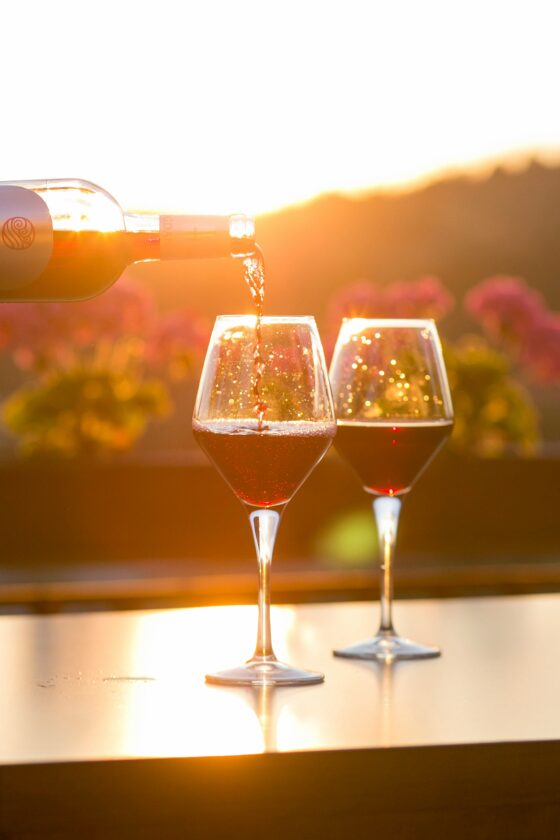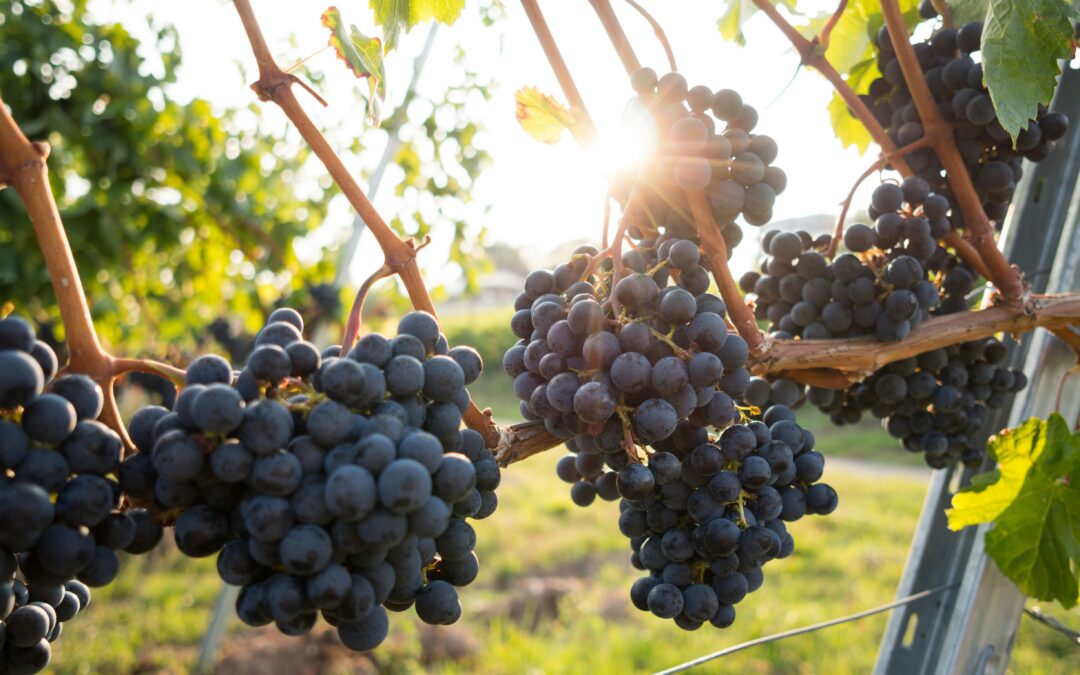Drink Up!
Happy harvest! Le vendange 2025 est arrivé! (“Vendange” is the French word for the wine harvest season). For most of the Northern Hemisphere, this can be as early as late August or as late as the end of October. It varies by region and varietal. In parts of California, this season can even extend into early November. Regardless of location, we are in the midst of the wine grape harvest season now. To celebrate the harvest, this article looks at a segment of the industry that is becoming increasingly popular: organic, biodynamic, sustainably farmed and natural wines.
Organic wines are those produced with organically grown grapes, meaning they are grown without the use of synthetic chemicals, pesticides, or added sulfites. Non-chemical additives including yeast, egg whites and rennet, a filtering agent, may be utilized by certified organic wine producers. The approved list of non-chemical additives varies from country to country. You may be familiar with the term “sulfites”, the sulfur dioxide found in wines. Sulfites are present in many consumables, including cured meats, cheese, canned soup, dried fruit, and French fries. This compound naturally occurs in wine, so virtually all wine has some sulfites at low levels. In the United States, a wine identified as organic is “a wine made from organically grown grapes without added sulfites.” So, if sulfites, or other synthetic additives, are a concern for you, organic wines may be a good option. The Allumea wines from Italy are great examples of excellent organic wines. They are available in the Allumea Rosso, a Montepulciano wine from Tuscany, the Allumea Nero D’Avola, a Merlo from Sicily, and the Allumea Grillo, a Chardonnay also from Sicily.
Sustainable agriculture practices have become more common in the wine industry. A sustainable certification requires the vineyard to use practices that conserve energy and water, and to promote the long-term health of the earth and the surrounding environment. Wine production takes a holistic corporate social responsibility approach to sustainability, following the three pillars of economy, society, and the environment. California is a leader through their statewide sustainability program, with about one-third of vineyards representing more than 85% of commercial wine production that is sustainably certified. J. Lohr Wineries is one of the many Golden State winemakers to earn this certification, with vineyards that produce the company’s very popular Arroyo Seco Monterey Chardonnay, the Falcon’s Perch Pinot Noir, the Paso Robles Merlot, and my favorite, the Tower Road Petite Sirah.
Biodynamic winemaking is a practice that incorporates aspects of organic and sustainable agriculture, and more. The philosophy behind biodynamic winemaking goes back a hundred years to an Austrian philosopher named Rudolph Steiner. Mike Benzinger, of Benzinger Family Vineyards in Sonoma, CA, says, “at its core, biodynamics is an energy management system.” Biodynamics works on a calendar of activities that include Fruit Days, Root Days, Flower Days, and Leaf Days. Prescribed viticultural activities, including everything from watering to harvesting, are allowed or forbidden depending on the day’s classification. Montinore Estates in Oregon has been practicing biodynamics since the early 2000s and received the Biodynamic Certification in 2008. The winery states that these practices are the most complete approach to land stewardship and the highest level of ethical farming practices in the industry. Montinore produces outstanding certified biodynamic and organic wines, including its Pinot Noir and Pinot Noir Reserve, its Pinot Gris, and the unique orange wine, the Montinore Estate L’Orange 2020.
The principal philosophy of natural wine is summed up in two words: minimal intervention. Grapes are allowed to grow and mature naturally in the vineyard, with no chemical pesticides, herbicides, or fertilizers. Organic farming practices are used, and many producers have also adopted the biodynamic approach to vineyard management. So, yes, although not all organic wines are natural wines, all natural wines are organic wines. Spontaneous fermentation is employed, utilizing only the yeast present on the grapes and in the environment, rather than using commercial yeast. Minimal or no sulfites are added to natural wine. Natural wine producers either do not add additional sulfites or only add what is necessary to preserve the flavor and shelf life of the wine.
Also, natural wine producers do not add sugar or other additives to enhance the flavor, color, or texture of the wine. Finally, many natural wine producers do not filter the wine to clarify it. As a result, many natural wines appear cloudy. The goal of natural winemakers is to allow the grapes and the wine made to express the terroir of the vineyard.
Although they have been produced for more than 6,000 years, orange wines have become popular in recent years. Christine Orange is a natural orange wine from Austria, made primarily from the Chardonnay and Sauvignon Blanc grapes. Winemaker Christina Nitzl has produced a very enjoyable wine with notes of tangerine, apricot, and peach, with a touch of white pepper and a notable minerality. This wine pairs well with curried Thai dishes, grilled fish or chicken, as well as shellfish.

Field Recordings ‘Skins’ White Blend is another natural orange wine from the Central Coast region of California. Skins is a blend of Chenin Blanc, Pinot Gris, and Albariño grapes. This medium-bodied wine has notes of dried apricot, orange zest, and white flowers with hints of ginger and crushed herbs. The wine’s fresh, crisp acidity leads to a dry, mineral-driven finish. Pair this with charcuterie, or with vegetarian dishes, pasta dishes, and seafood.
Glou Glou is a natural red wine from Las Jaras Wines that blends Zinfandel, Carignan, Sangiovese, and Valdiguié. This is perfect with Friday night foods like pasta with red sauce, pizza, burgers, or tacos. You will get the flavors of red plum, pomegranate, and cocoa powder, with a touch of spiciness. This one is a crowd pleaser. For a sweeter red wine, try Las Jaras Big Brule, a blend of Carignan, Zinfandel, and Petite Sirah. This semi-sweet red features flavors of dark cherry, plum, and blackberry as well as hints of cocoa nibs and allspice.
If this discussion of organic, biodynamic, sustainable, and natural wine was of interest to you, register for our Harvest Wine Tasting event at Passion Vines in Somers Point on Thursday, Oct. 23 at 6:30 p.m. We will discuss these concepts further and taste examples. Seating is limited; register early. As always, contact me with any questions or comments at dsetley@passionvines.com. Until next time, happy vendange and happy wining!
David Setley is enjoying his retirement from higher education as a wine educator and certified sommelier at Passion Vines in Somers Point, New Jersey.

















